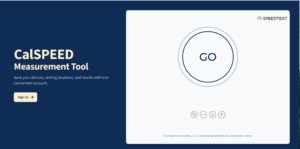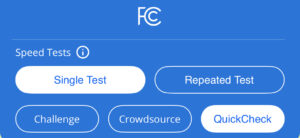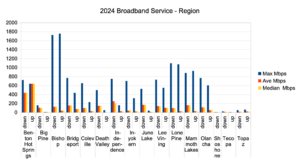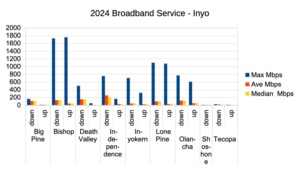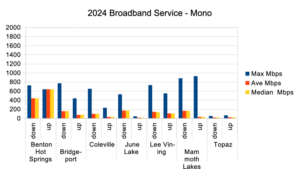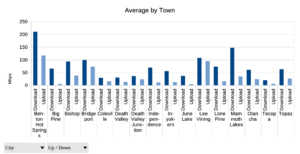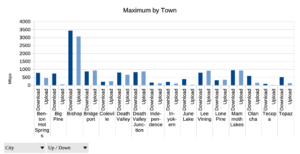Speed Tests
Test your Broadband Internet Speed
If you would like to verify that you’re getting the broadband Internet speeds that you should be getting, you can use any of the Internet speed tests on this web page. There are two embedded speed tests that allow you to run the test without leaving the IMBC website.
The State or Federal speed test tools are downloadable applications, and both compile speed test data to support the broader mission of improving broadband Internet services. Measurement Lab’s web-based speed test provides the largest collection of open Internet performance data on the planet. As a consortium of research, industry, and public-interest partners, M-Lab provides an ecosystem for the open, verifiable measurement of global network performance. Appealing to the more technically inclined web surfers, Cloudflare’s speed test provides quite a bit of detail with nicely presented data visualizations.
The new IMBC Speed Test, immediately below, incorporates the M-Lab speed test.
These aren’t the only speed tests available for you to use, but they are some of the more prominent tests. Also, some Internet service providers provide phone apps that you can use to test your speed to their network, indicating a good connection. These results represent the speeds between the equipment in your house and the provider’s equipment, which may be faster than your speeds to reach websites and services on the Internet.
After you have tested your broadband Internet speed, we’d appreciate it if you would report your speed test results to the IMBC using the button at the bottom of this page so that we can evaluate local speed test data.
Graphs showing the aggregated speed test results for 2023 and 2024 are at the end of this web page.
IMBC Speed Test
Welcome to the new IMBC Regional Speed Test Tool. This test uses the Measurement Lab speed test and will allow us to gather a copy of the speed test results along with any additional information you choose to provide.
This will open a new window for the speed test.
Simple Speed Test
An embedded, no-frills, simple speed test by Measurement Lab. When you click the Start button below, this speed test will run in this window without opening a new page.
Open Speed Test
Embedded Speed test by Open Speed Test. When you click the Start button below, this speed test will run in this window and will display the test results.
Provided by OpenSpeedtest.com
State of California Speed Test
The new CalSPEED test is here!
The CalSPEED speed-test tool is transitioning to an integrated tool to collect test results and feedback from the public and display relevant data on the California Broadband Map.
This speed test tool will implement the provisions of Assembly Bill 286 that require speed test features that will collect self-reported data including:
• how much they pay for stand-alone or bundled broadband service
• the internet service provider to which they subscribe for broadband service
• the maximum speed for broadband service to which they subscribe
• the ability to refute the broadband speed or technology, or both, that an internet service provider claims to offer at an address
• barriers to broadband access
The speed test works great and provides easily understandable test results. Creating an account is easy, but you apparently can’t use special characters in your username, so you can’t use your email address as your username.
FCC Mobile Speed Test App
The FCC National Broadband Map doesn’t just show you provider-reported broadband Internet speeds, it also shows provider-reported cellular service coverage. You can toggle the information on the map to show cellular coverage by clicking on the Mobile Broadband tab in the sidebar on the right side of the broadband map web page.
If the information on mobile coverage submitted by your provider does not match your reality, you can dispute that information by taking outdoor or in-vehicle (stationary, not while driving) Challenge Speed Tests on your mobile device using the FCC Mobile Speed Test app.
Challenge Speed Test results are analyzed and aggregated each month to determine whether there is a pattern of speed tests from the same area that meets the FCC’s threshold for creating a challenge. If such a pattern exists, the FCC will send a challenge to the provider for a response. If your Challenge Speed Test is part of a challenge sent to a provider, you will receive email messages with updates on the status of the challenge.
The latest version of this speed test includes options for a Single Test, Repeated Test, Challenge, Crowdsource, and Quick Test.
The Crowdsource Speed Tests allow you to test the speed of a mobile connection at a given place and time. These tests help the FCC evaluate mobile coverage across the United States and may help the FCC to verify the accuracy of the National Broadband Map.
The QuickCheck Speed Tests let you test the speed of your wireless network connection without submitting a challenge or sharing your contact information with the FCC.
Cloudflare Web-based Speed Test
speed.cloudflare.com is a tool that allows you to measure the speed and consistency of your connection to the Internet. You can use it to verify that the speed your ISP promised you is the speed you are getting, compare different ISPs or test network connectivity in different parts of your house. This speed test returns upload and download speeds, as well as idle (round-trip), download and upload latency speeds in milliseconds (ms).
The measurements run on the Cloudflare network, which spans data centers in over 300+ cities worldwide. This ensures you are testing against a server that is close to you, which means you are measuring only the speed of your ISP, with a minimum number of networks in between you and the test server to minimize the impact on your speed test results.
M-Lab Web-based Speed Test
For a simple test that doesn’t include installing an application, you can use the Measurement Lab’s web-based speed test. M-Lab makes the collected speed-test data available to the public, allowing researchers and anyone else to build on a common pool of network measurement information. Public organizations, academic researchers, regulators and companies around the world also use this data to understand the health of the Internet. Published information includes your IP address and test results, but doesn’t include any other information about you as an internet user. This speed test returns upload and download speeds, as well as idle (round-trip) latency speeds in milliseconds (ms).
The M-Lab project is sponsored by the charitable organization Code for Science & Society.
Netflix Speed Test
Netflix’ Fast.com speed test offers a very simple and easy-to-read web-based speed test. This speed test returns download speeds initially, and after clicking the “Show more info” button, it displays upload speeds, as well as loaded and unloaded latency speeds in milliseconds (ms).
Ookla Speed Test
Ookla offers a web-based speed test as well as downloadable speed test apps for a variety of devices and operating systems. This speed test returns download and upload speeds, as well as idle (round trip), download and upload latency speeds in milliseconds (ms). You can download apps from the Apps tab on the Ookla homepage.
Though this speed test page includes a lot of embedded and somewhat annoying advertisements, it is a respected speed test that offers open datasets for analysis, as well as source code to allow organizations to create trusted test nodes and participate in the Ookla data-collection efforts.
Ookla also provides access to their speed test data on their Open Data Initiative.
Report Your Broadband Speed Test Results
You can report your broadband Internet speed test results along with the service speeds that you should be getting. With this data, our Counties will be able to engage with service providers to improve service quality in areas where needed. This tool is intended to gather data only — speed test results reported here are not part of any resolution or escalation process. If you need to report an issue with your service, please visit your service provider’s website or visit the Connected Eastern Sierra Get Connected web page for links to support pages for known service providers in our area.
The Report Your Speed Test link also displays a graph that shows actual speed test results from our region, as well as some pie charts to provide an overview of the types of tests used, service providers, and test locations.
Last updated: August 26, 2025 10:54 am


